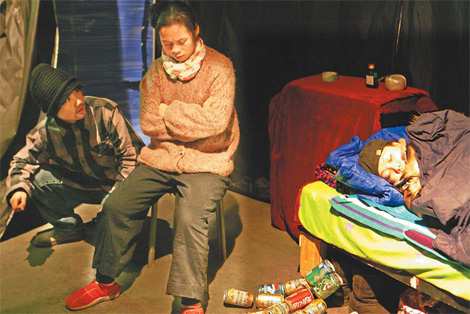Power play for migrant kids
Dongxiaokou village is a small neighborhood in northern Beijing, but in reality exists far away from the high-rises and flashy development that the city eagerly presents to the world.
Located near Liushiqiao subway station in northern Chaoyang district, the people living here have migrated mostly from Henan province.
|
|
|
In a scene of The Magic Storybox Experience, Xiao Chao (right) tries to sleep while his parents, who are migrant workers, argue. |
The narrow, unpaved alleys are beset with shanties and flimsy brick structures. The streets are filled with dust and garbage: piles of tiles and bottles, stacks of cardboard, wire and wrappers, all waiting to be recycled, which is the primary business around here.
At the end of a small street just off the main road is Mingxin Elementary School, and it is here where many of these workers' children receive an inadequate education, and usually not beyond the seventh grade.
For these children, Hua Dan's Magic Storybox Experience and workshops give them an opportunity to express themselves through art. In essence, it provides these children a chance to be just that - children.
Founded by Caroline Watson in Beijing five years ago, Hua Dan's focus is working with China's migrant worker population. The Magic Storybox Experience, which is more heavily theatrical than workshop-based, is new territory for Hua Dan and is set to have seven more performances at Mingxin before it tours other migrant schools in outer Beijing.
Early morning last Thursday, with temperatures firmly settled below-freezing, Hua Dan volunteers transformed a shabby, unheated classroom into a brand-new world for one lucky class of third graders. An elaborate and fantastical mural of a cityscape in the background, highlighted with glow-in-the-dark paint when the lights turned off, was the setting of fictional character Xiao Chao's world.
"Before they enter this place, I ask them to be quiet, to respect it," said Hua Dan's China Program Manager, Li Peng, a 27-year-old from Urumqi, Xinjiang. "It is a magical place."
Xiao Chao is a fictional archetype of a migrant child, who at such a young age, faces enormous challenges.
"Because they're always moving a lot, year after year they have to change schools," said Li Peng.
Xiao Chao and The Magical Storybox Experience were created to realistically represent their world - their school, their home and the nearby city. Using acting, storytelling, video, dance and music, adult volunteers help these children improve their communication and conflict resolution skills, as well as their confidence and creativity.
Part of Hua Dan's plan is to work with and train teachers. But in addition to finding adequate funding for quality equipment like lights, sound equipment and projectors, another harsh reality is that they are dependant upon the administration of the schools in which they work.
For many migrant students and their parents, who in China legally relinquish their right to a free education by moving to another area, the main interest of the schools is money, not education.
Mingxin Elementary School's principal charges 600 yuan per student per semester, and pays teachers 700-800 yuan per month. The classrooms, filled with over 40 students each, are unheated, with the paint coming off the walls.
"We come here and bring a lot of our own resources, but the principal wants us to pay for our own utilities," Li Peng said with disappointment.
Money squabbles are something these children are all-too familiar with as well.
In Xiao Chao's world, there are tests and mean teachers, parents who fight over his father's drinking problem and whether to bring the grandmother to live with them in the big city.
There is a scene in the play where Xiao Chao's parents take him to the subway and they get lost. Later on, when Xiao Chao searches for his missing father after hearing that their house will be torn down, he ventures to the city to find a world that is boastful and oblivious to him.
Three volunteers wearing building costumes come on stage. One building boasts: "I destroyed over 100 houses!" with a maniacal roar. Xiao Chao knocks on several doors only to hear the cries of spoiled children. "Will our house be destroyed?" he asks. "How does my father do all the construction, but our house is the one being torn down?"
Then the show stops. Li Peng goes on stage and asks the children: "Do you want to help Xiao Chao?" "Yes!" they shouted.
Then the children are asked whether more confidence, bravery and love can help Xiao Chao.
"We let the kids talk and hug Xiao Chao," several volunteers explained. "Then we ask all the actors to come to the stage and we all sing and dance together."
The goal is to make these marginalized children understand their worth. Even two days before the show begins, Hua Dan gives each of the kids a personal invitation to the show.
Yang Yang, another Hua Dan volunteer, said: "That's what makes them feel important."
 0 Comments
0 Comments







